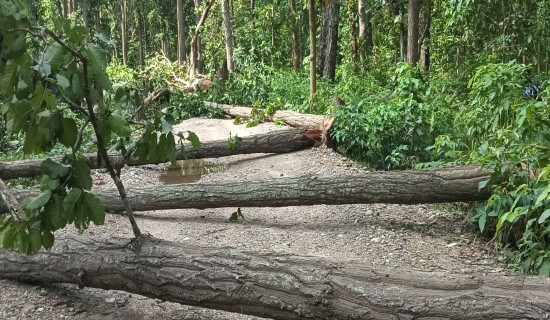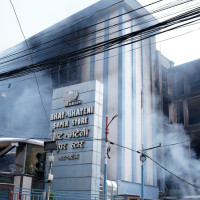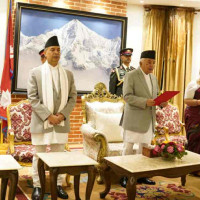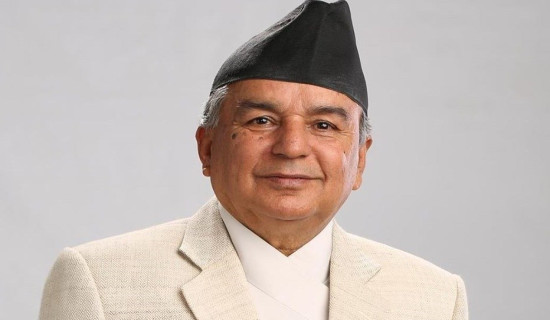- Saturday, 13 September 2025
Nepal-Qatar ties have deepened: Ambassador Dhakal
Recently, the Amir of Qatar, Sheikh Tamim bin Hamad Al Thani concluded a two-day state visit of Nepal. This visit has further elevated the bilateral relationship between Nepal and Qatar to newer heights, as important discussions and deliberations took place between the top leadership of both the countries. It is believed that this visit has instilled confidence in President Ramchandra Paudel and Prime Minister Pushpa Kamal Dahal ‘Prachanda’ to enhance the partnership between the two nations for a brighter future. Discussions during the visit have shed light on the benefits and potential of the relationship between the two countries and how to advance it further.
Dr. Naresh Bikram Dhakal, Nepal's Ambassador to the State of Qatar, spoke to journalists of The Rising Nepal Indira Aryal, Chandani Hamal of Gorkhapatra Daily, and Lucky Chaudhary of Gorkhapatraonline along with videographer and photographer Manoj Ratna Shahi and Keshab Gurung at Gorkhapatra Corporation office on wide ranging aspects of Nepal-Qatar bond in the context of Amir's Nepal visit. Excerpts:
How do you look at the significance and achievements of this just concluded state visit of Nepal by the Amir of Qatar?
For the first time, a Head of State from Arab countries has visited Nepal. The visit itself is historic. Since this visit includes representation from Arab nations for the first time, Nepal considers it a significant event. The invitation extended by President Ramchandra Paudel adds further significance to this visit. I have personally felt that this visit has been accorded great importance from the Qatari side as well. In a situation where efforts have been ongoing for a long time, I am also making continuous efforts. It is under this context that this state visit has been successful.
The relationship between Nepal and Qatar had been limited on labour migration. However, during the meeting between the leaders of the two countries during Amir's visit, discussions drifted beyond just labour issues. What topics received priority during the meeting that could lead both countries towards prosperity?
We have been closely observing this high-level visit from four perspectives. Firstly, it is a milestone for Nepal as it marks the first-ever visit by the Head of State from Arab countries. Secondly, to further strengthen the relationship between Nepal and Qatar, the important role played by Nepali brothers and sisters working in Qatar cannot be overstated. Their hard work and honesty in their work have been contributory. This not only earns praise from the Qatar government and people but also contributes positively to how Nepal is perceived by Qatar. Their efforts have provided a positive outlook towards Nepal.
Thirdly, according to recent records, there are around 364,889 Nepali citizens in Qatar, some of whom are employed in the government sector, some in the private sector, and others in non-governmental organisations. What steps have been taken by the Nepali government for their welfare is a matter that needs to be addressed. As almost 18 years have passed since the signing of the Nepal-Qatar Labour Agreement, it is time for its revision. Unfortunately, we have not been able to do so this time. The main reason for this is that while Qatar raised the issue of domestic workers from their side, we were unable to include it in the agreement.
Moreover, the issue of timely payment is also being raised. Discussions are still ongoing in this regard. There are many investment opportunities in Nepal. Agriculture, hydroelectricity, tourism, and the potential for airport development are just a few examples. There is also great potential in various other sectors. Both our President and Prime Minister have raised these issues with a high priority. Establishing a high-level committee to study these issues and determine which sectors are feasible for investment and then proceeding with long-term planning will be fruitful in the long run.
After the attack by Hamas on Israel, Nepali student Bipin Joshi has gone missing and is suspected to be taken hostage by the Hamas. Nepal has requested for Qatar's role for securing Joshi's release. What expectations can we have regarding Qatar's coordinating and mediation role in this regard?
I want to analyse this from two angles. First, even before this visit from Nepal's side, a written request for the facilitation of Bipin’s release, along with his identity, was sent to the Ministry of Foreign Affairs in Qatar. During the sidelines of the Doha Forum, immediate arrangements were made for a side meeting attended by the then Foreign Minister of Nepal, NP Saud, along with the ministers and Foreign Ministers of the two other countries. Minister Saud raised the issue there. We have continuously been making efforts for the release of Bipin.
Secondly, with the visit of Qatar's Amir, the President and Prime Minister of Nepal have also raised Bipin’s issue with high priority. Even the team that came from Qatar's side under the leadership of the Amir gave significant importance to this issue. Perhaps this incident, which was unfortunate for all, is because of Nepal's non-aligned foreign policy. We did not want to get stuck in any dispute between the two countries. It's sad for us to see students who went to learn and earn there being stuck in such a situation. I met Bipins’ parents just recently. I assured them that I would remind the Qatar government to help for Bipin’s release when I go there.
How has Qatar's perspective towards Nepal been shaped? Has this visit been able to bring any difference in the traditional perspective?
This visit has notably shifted Qatar's perspective. Two points are evident. Firstly, while Nepal traditionally sent unskilled labourers to Qatar, the country now seeks skilled workers due to a decline in its own construction activities. We have consistently advocated for this in various forums. Nepal presents promising opportunities, akin to IT, and across other sectors. Qatar's government has positively acknowledged proposals from the Nepali government. This indicates a potential flux of highly skilled workers to Qatar in the future. However, we recognise the need for improvements on our part.
After the meeting between Prime Minister Prachanda and Qatar's Amir, how have the agreements paved way for a new partnership?
Significant understandings have been reached between the two countries, emphasising long-term mutual benefits and partnerships. An agreement for news exchange has been made between the National News Agency (RSS) and the Qatar News Agency, highlighting the importance of communication among journalists. Also, agreements higher education, scientific research, and two in the private sector for investment partnerships have been established. While signing agreements is important, their implementation holds greater significance. It will require the concerned Nepali ministries, authorities, or sectors to design and approve relevant proposals and negotiate with Qatar for their implementation. This model could ensure the implementation of all eight agreements, benefiting Nepal in the long run.
Why could not the investment security agreement between Nepal and Qatar materialise?
The investment security agreement, crucial for both Nepal and Qatar, was on the agenda during the third Investment Summit in Nepal. Meetings were held in Qatar to address this, aiming to ensure security for investments and smooth returns. While the document was prepared from Nepal's side, the signing was postponed for further deliberation. Pending issues need resolution before signatures are exchanged. However, I am confident that during my tenure, we will establish this crucial agreement between the two countries.
Many Nepalis are still compelled to stay in Qatari jails. How can we address the issue of labour exploitation and legal complexities between the two countries?
There are challenges to address the issue of some people landing in jail and other legal complications. The main reason often cited is the lack of proper training in Nepal. Some directly fly there without adequate knowledge of the legal procedures. Many face such problems due to a lack of awareness about the legal process there. What might be considered normal here becomes abnormal there. People do not understand the complexities until they face them. Despite some progress, addressing issues of those imprisoned and signing agreements during visits to Nepal by Qatari legal representatives and public initiatives is crucial.
After that, perhaps by looking at the situation of some prisoners in jail and discussing matters related to returning them to Nepal, internal discussions have progressed. Those who go through this understand the importance of suffering the punishment in their own country. They maintain connections with their families. For that reason, it is better to pay for one's mistakes in one's own country rather than in another country, where one may end up in jail not just to repay money but simply to stay there.
How are Nepali workers' issues being addressed in Qatar by the Nepali mission there under your leadership? How is the embassy working in this regard?
We have various branches -- one for passport and visa inquiries, and another for labour issues. Coordination is maintained with the deputy chief of mission. Problems such as delayed salaries, illegal migration, unemployment upon arrival, and company transfers are reported to the lower desk first. The company is contacted for resolution of a problem, but if unsuccessful, help of labour laws in Qatar is sought which favour the workers. Non-payment leads to legal action, and the labour court is the final resort. Currently, insurance of labourers is covered on hourly basis only which does not include life insurance. We have been raising the issue of full time insurance coverage at the UN.
Qatari citizens are significantly underrepresented as tourists in Nepal. What plans are there to attract Qatari citizens as tourists here?
The visit of a member of the Qatari royal family who climbed Mount Everest and awareness about Sagarmatha and other Himalayan regions have significantly impacted Qatari citizens' perspectives. When the Amir visited Nepal, it brought about a profound change in Qatari citizens' perceptions. This indicates their growing interest in exploring the country.
















